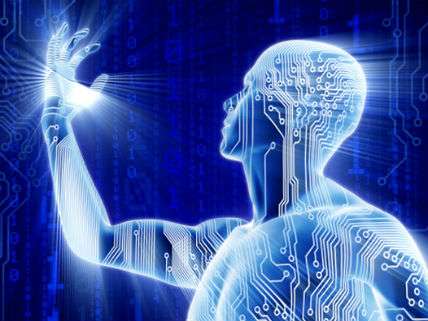Ronald Bailey Argues for Transhumanism at the Washington Post
My fellow Americans should not get to vote on what enhancements I might want

"Technology Won't Undermine Human Dignity: Fear of Change Will," is my contribution to the Washington Post's In Theory symposium on transhumanism. In that column, I argue against opponents that the decisions to use life-enhancing bio-, nano- and infotech should be left to individuals, not decided by majority vote. From the column:
The prospect of technologically enhanced humans flourishing makes some people uncomfortable. The "bioconservative" alliance of moralizing neoconservatives and egalitarian left-wingers fears that the new bio-, nano-, and info-technologies threaten human dignity and human equality, but these egalitarian worries are overblown — and, in fact, they go against the liberal society that transhumanism's opponents revere.
The highest expression of human nature and dignity is to strive to overcome the limitations imposed on us by our genes, our evolution and our environment. Future generations will look back at the beginning of the 21st century and be astonished that some well-meaning and intelligent people actually wanted to stop bio-nano-infotech research and deployment just to protect their cramped and limited vision of human nature. If transhumanism is allowed to progress, I predict that our descendants will look back and thank us for making their world of longer, healthier and abler lives possible.
Other participants in the symposium include:
Founder of Yale Students and Scholars for the Study of Transhumanism David Vincent Kimel, "In Defense of Transhumanism."
In our future, daily life will be transformed through the increasing automation of labor and the rise in sophistication of artificial intelligence. Life may be less about the 9-to-5 grind and more about education, community and the creation and enjoyment of art. Rather than imagining a future in which humans and machines are at odds — as many thinkers have predicted — transhumanists look forward to the advent of cyborgs, in which computers are incorporated into the brain itself, leading to radically enhanced processing power and the ability to preserve consciousness for lengths of time now deemed inconceivable. The ultimate lesson from transhumanism's origins in science fiction is perhaps to seek those inventions that would radically enhance lifespans and empower the human imagination to control what it experiences in ways hitherto unimaginable, liberated from the genetic and circumstantial wheel of fortune.
Executive director of the Institute for Ethics and Emerging Technologies James J. Hughes, "Soon We Will Use Science to Make People More Moral."
Drugs, devices and gene therapies will soon allow us to safely suppress our appetites with a level of control only seen in ascetics and achieve transcendent states previously only accessible to yogis. Addictions will be treatable with implants, vaccines and therapies that enable the brain to unlearn dependencies. Psychedelic drug studies and brain imaging of meditators are suggesting ways to turn off neurotic self-absorption and tune into oneness and awe.
Duquesne University political philosopher Charles T. Rubin, "Transhumanists Are Searching for a Dystopian Future."
With great power ought to come great responsibility. The libertarian strain that is so powerful among transhumanists makes them imagine that such responsibility need be exercised only by individuals making choices about how to modify themselves or their children. What popular culture imagines is that transhumanist promises are being made by flawed human beings to flawed human beings, and that as a result the consequences of their decisions will likely have a broader reach than they anticipate. As a result, the great powers that transhumanism promises are likely to be used not in ways that will solve human problems, but in ways that will perpetuate them yet more terribly.
Washington Post In Theory editor Christine Emba offers a primer on transhumanism for the bewildered, "Will Technology Allow Us to Transcend the Human Condition."
Transhumanism, in its most extreme manifestation, is reflective of an increasingly pervasive and influential school of thought: that all problems can and should be solved with the right combination of invention, entrepreneurship and resource allocation.
For more background see my article, "The Case for Enhancing People."
